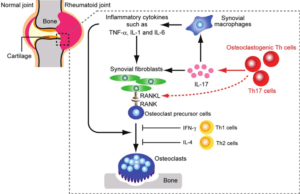
Regulation of osteoclast differentiation in Rheumatoid arthritis: Upregulation of proinflammatory cytokines activates osteoclastogenesis. Kazuo Okamoto and Hiroshi Takayanagi 2011. Arthritis Research and Therapy.
A healthy skeletal system is an outcome of the balance between bone formation by osteoblasts and bone resorption by osteoclasts. Any imbalance in their activity plays a fundamental role in the pathogenesis of osteoporosis. Osteoporosis is a silent disease affecting millions of people around the globe and contributes to the degradation of quality of life during old age. Chronic inflammation facilitates the excessive resorption activity by osteoclasts giving rise to osteoporotic fractures. Therapeutic intervention to regulate the activity of proinflammatory cytokines during chronic inflammation holds the key to curtail the inflammation induced osteoporosis and maintain bone metabolism.
Recent work by Shan-Shan Rao et. al, has highlighted the potential of Omentin-1 in downregulating the activity of proinflammatory cytokines, thereby unravelling its mechanism in inhibiting the inflammation-induced osteoporosis. Omentin-1 is an adipocytokine found in human visceral fat tissue and in mouse small intestine. By using global Omentin-1 knock out mouse (omentin -1-/-), the authors have shown that absence of omentin-1 leads to remarkable increase in proinflammatory cytokines resulting in dysregulated inflammatory response. Also, the absence of Omentin-1 gave rise to disintegration of bone micro-architecture leading to abnormal bone metabolism.
Extensive investigations have revealed that proinflammatory cytokines plays an important role in bone homeostasis. Inhibition of proinflammatory cytokines controls chronic inflammation which eventually has an anti-osteoporotic effect. Authors in this work have very well showed that Omentin-1 could weaken the production of proinflammatory cytokines in inflammatory macrophage cell model, which thereby restrains its anti-osteoblastic and pro-osteoclastic effects. Bone morphology was maintained by Omentin -1 treatment in mice models having magnesium silicate-induced inflammation.
Considering the needs of the aged society, Omentin-1 can prove to be a good potential therapeutic for downregulating the proinflammatory cytokines and aiding in the maintenance of bone homeostasis.
Journal Article: Shan-Shan Rao et.al, 2018, Omentin-1 prevents inflammation-induced osteoporosis by downregulating the pro-inflammatory cytokines. Bone Research
Article by Babita Balakrishnan










